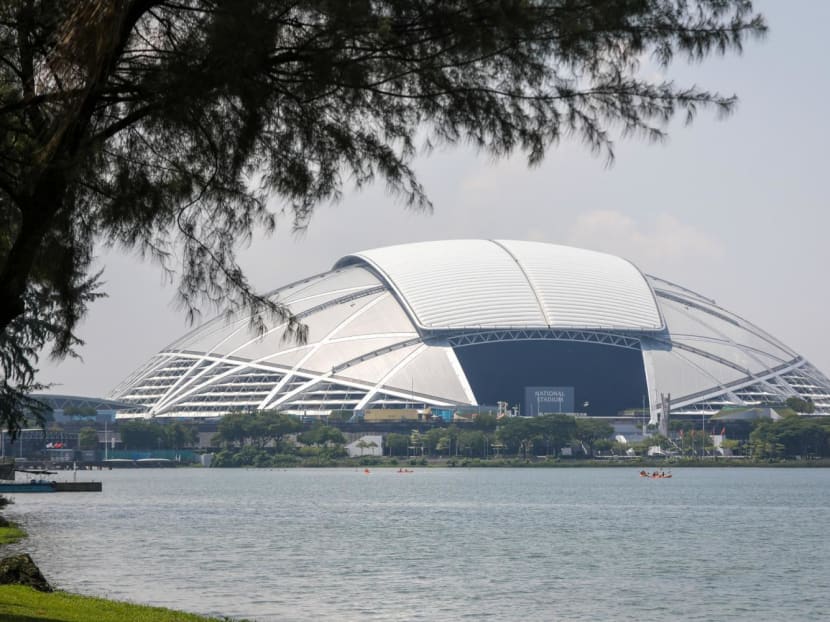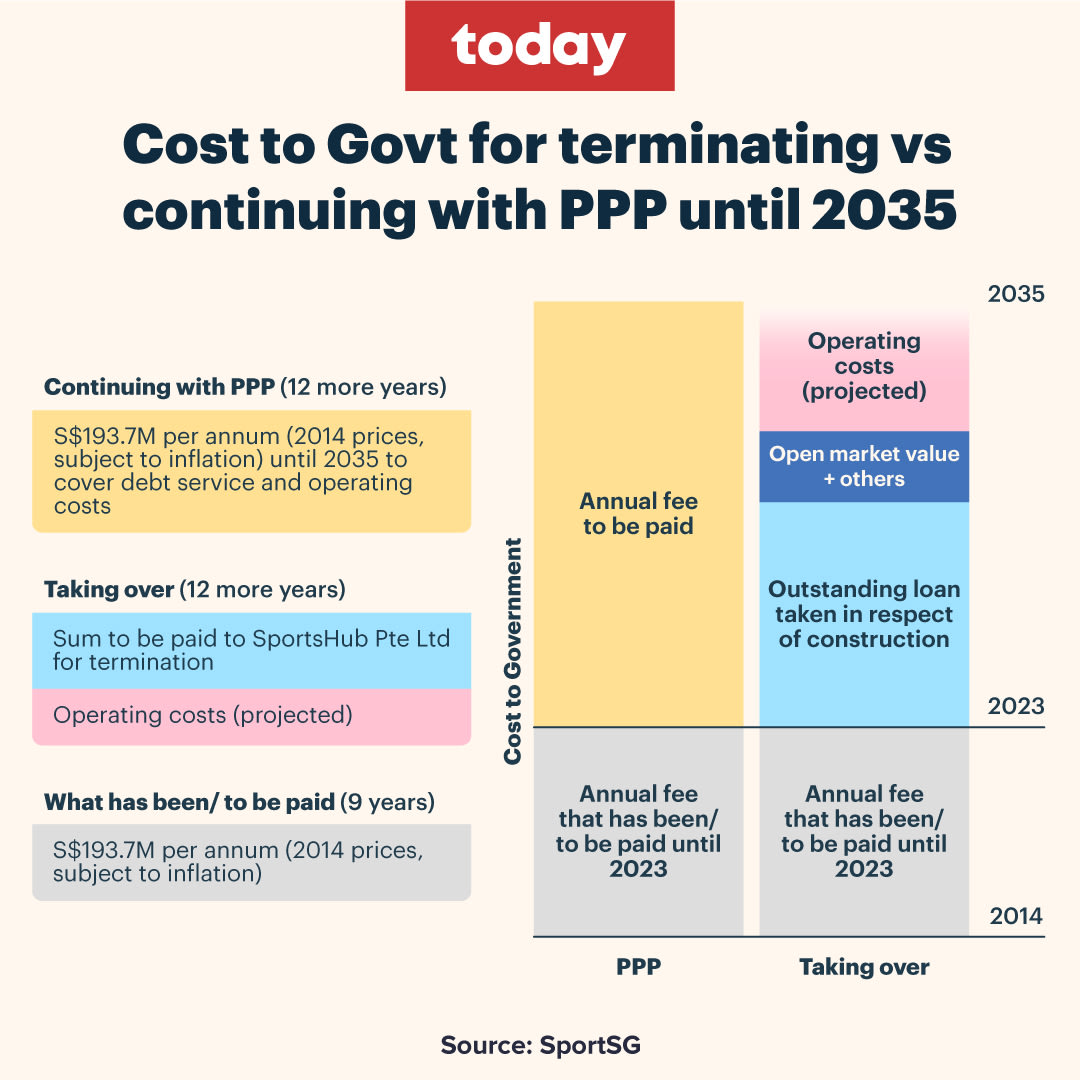Govt terminates Sports Hub public-private partnership; SportSG to take over full ownership, management from Dec 9
SINGAPORE — The Government will take back ownership and management of the Singapore Sports Hub from Dec 9, terminating the public-private partnership agreement 13 years ahead of time.

- The Government will take back ownership and management of the Singapore Sports Hub from Dec 9
- SportSG said it wants to unlock the hub’s full potential for Singapore
- It will work very closely with private consortium SHPL on the transition to ensure that there is no disruption
- The terms of the public-private partnership project agreement allowed for SportSG to decide if and when the project should be terminated, without penalty
- SportSG will pay SHPL a termination sum that takes into account a few components, which have been specified in the agreement
SINGAPORE — The Government will take back ownership and management of the Singapore Sports Hub from Dec 9, terminating the public-private partnership agreement 13 years ahead of time.
At a press conference on Friday (June 10), Sport Singapore (SportSG) said it and SportsHub Pte Ltd (SHPL) have mutually agreed to terminate the agreement on the integrated sports, entertainment and lifestyle hub.
The exact cost that SportSG incurred for the takeover was not publicised, but its CEO Lim Teck Yin said that the total cost of the changeover will be “comparable” to the yearly fee that SportSG would have paid SHPL under the existing arrangement. Based on the annual fees of S$193.7 million, this works out to be about S$2.32 billion if the agreement is continued until 2035.
SportSG chairman Kon Yin Tong said there had been a “confluence of factors for the decision”, but ultimately, it wants to unlock Sports Hub’s full potential for Singapore.
For instance, as Singapore emerges from Covid-19, Sports Hub has seen a sharp rise in demand for large-scale sport, lifestyle and entertainment events driven by a stronger desire for people to physically come together, he said.
He added that there is increased competition in the region as new sports facilities are being developed in other Asian capital cities.
"We need to maximise the value of the Sports Hub in the region with the view of ensuring that it keeps up with the times and competitive landscape as well as the new needs of the nation," said Mr Kon.
"We intend to make the Sports Hub more accessible to the broader community in Singapore in terms of sports, lifestyle, entertainment, leisure and social uses while maintaining its commercial sustainability."
Mr Lim said that the next six months will be a very important period where SportSG will work very closely with SHPL on the transition “to ensure that there's no disruption in our day-to-day activities”.
One way to do so, said Mr Lim, would be to allow existing Sports Hub staff to continue their employment under their management.
In any case, Mr Lim said the terms of the public-private partnership project agreement allowed for SportSG to decide “if and when the project should be terminated”, without penalty.
“Upon termination, SportSG will pay SHPL a termination sum which takes into account a few components which have been specified in the project agreement,” he said.
The termination sum comprises substantially of:
- The outstanding loan taken in respect of the construction of the Sports Hub, an expenditure that would have been incurred by SportSG had it financed the Sports Hub from the start without the public-private partnership
- Sports Hub's open market value
Mr Lim declined to reveal the sum of the termination costs and operating costs.
"The open market value is commercial and (in) confidence, it's a very important aspect to not just be able to negotiate this, but also for SHPL to preserve its future negotiations with other partners," he said.
Mr Kon added that the cost of the takeover should not be the key focus.
"Don't be so fixated on costs and profitability, I think you need to look at the value this takeover will being to Singapore," he said. "Look at the potential, and the potential is not just in dollars and cents, it's a bit more than that."
In a Facebook post on Friday, Mr Edwin Tong, Minister for Culture, Community and Youth, said that the move will bring more Singaporeans to the Sports Hub.
"We want more Singaporeans to come to the National Stadium, to develop an affinity with, and feel proud of our stadium and its sporting infrastructure, which should also very much be part of our day-to-day lived sporting experience," he said.
"We intend to bring in more school events, community sport programmes and other events, and regularly open the doors for the casual jogger or stroller to exercise at the stadium tracks in the evenings."

The Sports Hub was completed in June 2014, after three years and nine months, at a cost of S$1.33 billion.
The public-private partnership, in which SHPL was chosen in 2010 to design, build, finance and operate the hub, allowed the Singapore Government to benefit from private sector financing and expertise, he said.
Mr Lim said this approach freed up resources for allocation to other urgent needs, following the 2008 global financial crisis, and allowed risks — such as those in construction — to be shared with the private sector.
SHPL took on the upfront financing of the project and, in return, SportSG made an annual payment of S$193.7 million to SHPL, starting in 2014, to run the Sports Hub.
Mr Lim added that SHPL was chosen under a public-private partnership in 2010 to design, build, finance and operate the Sports Hub. It was chosen, he said, because of its comprehensive proposal — particularly its focus on community and grassroots sports.
The SportSG representatives said that since then, the operating environment for sports and entertainment has changed considerably.
The 35ha site, they said, is also facing greater competition from developments coming up in the region.
“The ownership and direct management of the Sports Hub will… enable Singapore to have greater control and flexibility over arrangements at the Hub,” said Mr Lim.
“With this move, we intend to drive stronger social, sporting and economic outcomes for Singaporeans to maximise the potential of the precinct and to take a stronger hand in developing our own sport and lifestyle industry ecosystem,” he said.
Agreeing, Mr Kon said: "Taking over ownership and full control will allow us to unlock greater potential from the Sports Hub and will enable closer integration within the Sports Hub and other facilities within the Kallang Alive Precinct by integrating programmes across the entire precinct," he said.
The Kallang Alive Precinct is a mixed-use lifestyle precinct anchored by the Singapore Sports Hub and other sports and entertainment venues, including a football hub, tennis centre, youth hub and velodrome.
Highlighting a number of examples in press materials, SportSG said Singaporeans can expect to see regular open houses for the community, as well as making the Sports Hub home to school sports.
Aside from that, there will be upcoming facilities such as a Tennis Centre, Kallang Football Hub, Kallang Theatre Integrated Development and a Youth Hub.
Asked if the takeover of Sports Hub indicates that the public-private partnership had failed, Mr Lim disagreed.
"The project agreement under the (public-private partnership) envisaged the right to terminate, and obviously when you build in the right to terminate, it suggests that there is always a consideration for the evolving context... for something that you cannot foresee over such a long period," he said.
"We do look to the future, and the future suggests to us that we are going to be able to... achieve much more of the social outcomes that we aspire to (such as) bringing Singaporeans together... being able to compete as a sports and lifestyle destination in a region that is growing quickly."
SportSG also added that it will be engaging SHPL employees to discuss employment opportunities.
"We intend to retain the expertise and experience of SHPL employees, who will be given the opportunity to transit into the new corporate entity."
When asked about his future at the Sports Hub, SHPL chief executive officer Lionel Yeo, who was at the press conference, declined to comment on whether he would be staying on.
"Today really is not about me, it's about the project," he said. "My focus for the next six months is to work with my colleagues and partners to ensure that there is as smooth a handover as possible to SportSG."
Agreeing, SHPL chairman Bryn Jones said in a statement that it supports SportSG's move.
"We support the Government’s ambitions in promoting sport among the population and harnessing Sports Hub’s potential to transform the Kallang Alive precinct," he said.
"We will work collaboratively and constructively to ensure a smooth transition over the next six months."













